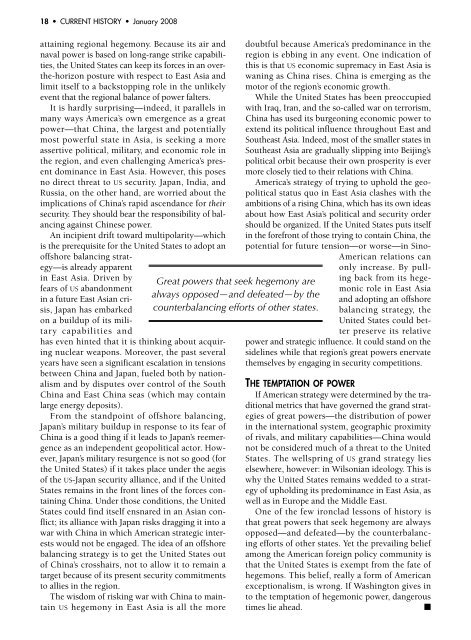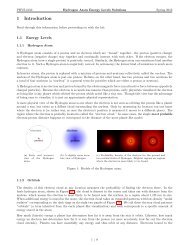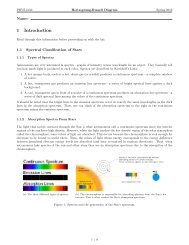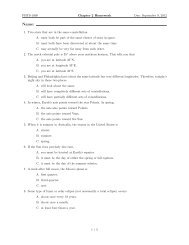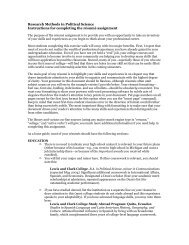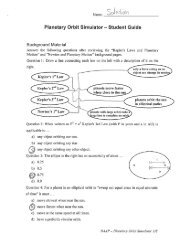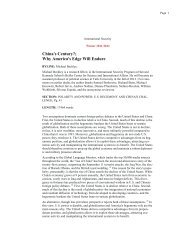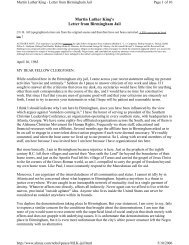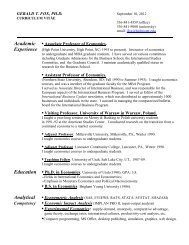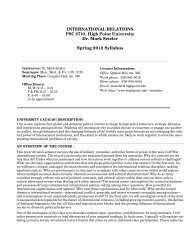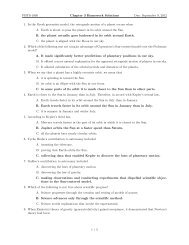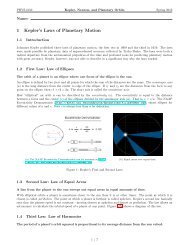China's Challenge to US Hegemony - High Point University
China's Challenge to US Hegemony - High Point University
China's Challenge to US Hegemony - High Point University
Create successful ePaper yourself
Turn your PDF publications into a flip-book with our unique Google optimized e-Paper software.
18 • CURRENT HISTORY • January 2008<br />
attaining regional hegemony. Because its air and<br />
naval power is based on long-range strike capabilities,<br />
the United States can keep its forces in an overthe-horizon<br />
posture with respect <strong>to</strong> East Asia and<br />
limit itself <strong>to</strong> a backs<strong>to</strong>pping role in the unlikely<br />
event that the regional balance of power falters.<br />
It is hardly surprising—indeed, it parallels in<br />
many ways America’s own emergence as a great<br />
power—that China, the largest and potentially<br />
most powerful state in Asia, is seeking a more<br />
assertive political, military, and economic role in<br />
the region, and even challenging America’s present<br />
dominance in East Asia. However, this poses<br />
no direct threat <strong>to</strong> us security. Japan, India, and<br />
Russia, on the other hand, are worried about the<br />
implications of China’s rapid ascendance for their<br />
security. They should bear the responsibility of balancing<br />
against Chinese power.<br />
An incipient drift <strong>to</strong>ward multipolarity—which<br />
is the prerequisite for the United States <strong>to</strong> adopt an<br />
offshore balancing strategy—is<br />
already apparent<br />
in East Asia. Driven by<br />
fears of us abandonment<br />
in a future East Asian crisis,<br />
Japan has embarked<br />
on a buildup of its military<br />
capabilities and<br />
has even hinted that it is thinking about acquiring<br />
nuclear weapons. Moreover, the past several<br />
years have seen a significant escalation in tensions<br />
between China and Japan, fueled both by nationalism<br />
and by disputes over control of the South<br />
China and East China seas (which may contain<br />
large energy deposits).<br />
From the standpoint of offshore balancing,<br />
Japan’s military buildup in response <strong>to</strong> its fear of<br />
China is a good thing if it leads <strong>to</strong> Japan’s reemergence<br />
as an independent geopolitical ac<strong>to</strong>r. However,<br />
Japan’s military resurgence is not so good (for<br />
the United States) if it takes place under the aegis<br />
of the us-Japan security alliance, and if the United<br />
States remains in the front lines of the forces containing<br />
China. Under those conditions, the United<br />
States could find itself ensnared in an Asian conflict;<br />
its alliance with Japan risks dragging it in<strong>to</strong> a<br />
war with China in which American strategic interests<br />
would not be engaged. The idea of an offshore<br />
balancing strategy is <strong>to</strong> get the United States out<br />
of China’s crosshairs, not <strong>to</strong> allow it <strong>to</strong> remain a<br />
target because of its present security commitments<br />
<strong>to</strong> allies in the region.<br />
The wisdom of risking war with China <strong>to</strong> maintain<br />
us hegemony in East Asia is all the more<br />
Great powers that seek hegemony are<br />
always opposed—and defeated—by the<br />
counterbalancing efforts of other states.<br />
doubtful because America’s predominance in the<br />
region is ebbing in any event. One indication of<br />
this is that us economic supremacy in East Asia is<br />
waning as China rises. China is emerging as the<br />
mo<strong>to</strong>r of the region’s economic growth.<br />
While the United States has been preoccupied<br />
with Iraq, Iran, and the so-called war on terrorism,<br />
China has used its burgeoning economic power <strong>to</strong><br />
extend its political influence throughout East and<br />
Southeast Asia. Indeed, most of the smaller states in<br />
Southeast Asia are gradually slipping in<strong>to</strong> Beijing’s<br />
political orbit because their own prosperity is ever<br />
more closely tied <strong>to</strong> their relations with China.<br />
America’s strategy of trying <strong>to</strong> uphold the geopolitical<br />
status quo in East Asia clashes with the<br />
ambitions of a rising China, which has its own ideas<br />
about how East Asia’s political and security order<br />
should be organized. If the United States puts itself<br />
in the forefront of those trying <strong>to</strong> contain China, the<br />
potential for future tension—or worse—in Sino-<br />
American relations can<br />
only increase. By pull-<br />
ing back from its hegemonic<br />
role in East Asia<br />
and adopting an offshore<br />
balancing strategy, the<br />
United States could better<br />
preserve its relative<br />
power and strategic influence. It could stand on the<br />
sidelines while that region’s great powers enervate<br />
themselves by engaging in security competitions.<br />
the temptation of p o w e R<br />
If American strategy were determined by the traditional<br />
metrics that have governed the grand strategies<br />
of great powers—the distribution of power<br />
in the international system, geographic proximity<br />
of rivals, and military capabilities—China would<br />
not be considered much of a threat <strong>to</strong> the United<br />
States. The wellspring of us grand strategy lies<br />
elsewhere, however: in Wilsonian ideology. This is<br />
why the United States remains wedded <strong>to</strong> a strategy<br />
of upholding its predominance in East Asia, as<br />
well as in Europe and the Middle East.<br />
One of the few ironclad lessons of his<strong>to</strong>ry is<br />
that great powers that seek hegemony are always<br />
opposed—and defeated—by the counterbalancing<br />
efforts of other states. Yet the prevailing belief<br />
among the American foreign policy community is<br />
that the United States is exempt from the fate of<br />
hegemons. This belief, really a form of American<br />
exceptionalism, is wrong. If Washing<strong>to</strong>n gives in<br />
<strong>to</strong> the temptation of hegemonic power, dangerous<br />
times lie ahead. ■


